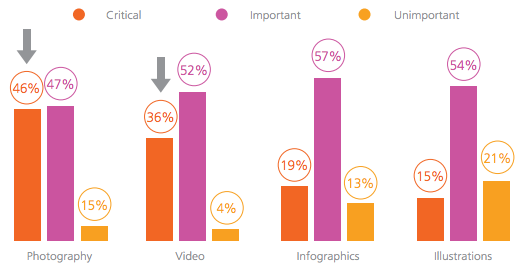Content marketing teams come in all shapes and sizes.
- Some teams are small, with only a few creators (or a single creator) taking on multiple roles.
- Other teams are a lot larger, with more specialized responsibilities and even multiple people tackling the same jobs.
As your content team grows in size your ability to produce high quality content increases.
It’s important that this growth happens in the right direction, though, and there are several dream team members that you should consider including as your projects increase in scale.
1. Content Creator
No matter how big or small your content team might be, you need at least one person fulfilling the role of content creator.
- This is the team member who is responsible for actually creating the content – writing articles, making videos, recording podcasts, or doing whatever else needs to be done to get the content made.
- Without this member of the team, your content marketing strategy will understandably fall short – you’ve got to have substance before you can market anything.
Initially your content creator will likely be handling that role alongside several others – if you’re a one man team, you’ll be handling other jobs such as tackling social media or choosing your own visuals.
As you scale your team, though, creating a dedicated content creator position should be your first priority:
- The more high quality can be produced, the more you’ll have to market and the fewer distractions there will be to your content strategy as a whole.
- As your team grows bigger, it’s worth adding additional content creators to ensure that your content strategy is meeting its potential by producing as much high quality work as quickly as possible.
No matter whether you have one content creator or a hundred, they should all be subject to an editor, and should take the editor’s lead whenever a question of format, tone or style comes up.
2. Creative Editor
Having a decent editor is vital to the success of your marketing campaign.
An editor’s responsibility is to direct the creator, ensure that everything they produce matches the required tone and style of the campaign, and keep the wheels running smoothly whenever an issue arises.
In practical terms this can include:
- Assigning topics and providing guidance on them when needed
- Checking over works, and editing or altering bits that are out of place or detract from the content’s message
- Proofreading to ensure that the content is at the highest level of quality possible
While all of the roles on this list can potentially be performed by a single person, it’s hugely beneficial to have a separate person providing editing roles where possible, and when a content team grows, the first role that should be separated out should be that of the editor.
This is because the editor provides a second pair of eyes for the content:
- They’ll be able to give a second perspective on content development and what will work to attract audiences and convey the right message
- They’ll pick up on mistakes, errors or parts of the content that should be changed to improve the quality.
- Once a team gets to the stage that it has several content creators, having a single editor helps to ensure that all the content fits the same tone and style – everything will match the content that already exists.
While the content creator is essential for making sure that content is produced, the editor is the person who’s increases the level of quality and makes sure that all content looks its best.
3. Social Media Promoter
While the first two roles on this list focus on the creation of content, the promoter’s role is to make sure content can travel as far as possible.
In order to be an effective social media advocate for your content, your promoter will need to have various skills:
- The ability to share content in a compelling, interesting way that will draw in attention
- A warm, outgoing manner that will help to build a rapport and relationship with online followers, encouraging them to take action
- At times it may also be necessary for the promoter to perform some small bursts of content creation or editing – changing assets such as visuals to fit different uses and grab attention.
More than anything, though, the promoter’s job is to get the word out about your content.
Once your team grows to the point when it can sustain a dedicated social media manager, it’s useful to have one:
- Content is only useful if it’s being seen by people – it helps to have someone whose sole job is to get people to engage with and share your content
- This way, not only is attention not being diverted from content creation roles, but the existing content is given an opportunity to travel further than would be possible with a smaller, busier team.
Even if your social media promoter is also doubling up by performing other roles, it’s essential that you have someone who’s performing this job.
Your content creator is essential so that you have content to promote. Your promoter is essential so that your content is actually seen by people.
4. Curator
When you’re working as a smaller team, it’s possible that a curator won’t be necessary immediately.
- Initially, a lot of curation roles will be undertaken either by the content creator or the editor.
As things grow, and you amass a larger collection of content, having a specific, set apart curation role for your team will help you to manage all of your previous content.
A curator is responsible for expanding your content efforts to include works created by other creators.
In practice, this will play out differently depending on the needs of each campaign. Depending on the focus of a content marketing effort, a curator might be responsible for:
- Collating and reposting content from a variety of contributors to help site visitors find additional resources.
- Creating weekly roundup posts about interesting content your regular audience might want to see.
- Feeding interesting articles and resources to your social media promoter to give them additional topics to discuss.
This role grows in relevance depending on how much content you want to feature on your site.
- The goal behind having a curator is not just posting regular home-grown content, but turning your website and social media presence into a hub for relevant ideas.
- A content curator keeps people coming back for more content regularly, and places your business at the heart of discussions surrounding your field.
With a decent content curator, all the relevant content on the internet relating to your business can be leveraged to increase your reputation and draw in audiences.
5. Visual Producer
Images matter to content: there’s no denying that.
- Text content with images included has 650% higher engagement than text-only content.
- Around half of all marketers feel that image-based content is important to their marketing strategy.
The use of visual content and the presentation of all forms of content will affect the way your marketing materials are interpreted by audiences.
- While to begin with, you might not have the need for a dedicated designer, even from the start of your content plans you’ll need somebody to take on visual roles.
- As your content sees growth and your team begins to diversify, it’s important to include a dedicated content designer or visual producer to make the most out of your visual opportunities.
Having a single visual expert on your team is as important as having a single editor:
- Doing so ensures that your content will have a unified look and feel.
- The editor should work closely with the visual producer to keep all content within the right tone and style for the campaign.
Through the use of compelling, eye-catching visuals, you give your content the potential to travel further and make an impression on a wider audience.
6. Analyst
There’s an old stereotype that says that creative types are no good at math.
While it’s not true in all cases, considering the wealth of other responsibilities that other members of your content team are involved in, it’s often helpful to split off the role of analyst when the opportunity presents itself.
Analysis of content performance is key to understanding what’s working well in your campaign, and what needs work:
- Website traffic gives you an initial indication of how popular various pieces of content and related topics are.
- Tracking social media shares and trends can help to guide how future content is distributed.
- Sales and conversion progress figures help to chart out which parts of the content marketing experience need further work, and where more content might be needed.
There’s no hard and fast rule to how statistics related to your campaign should be interpreted, and it can be dangerous jumping to conclusions over what performs well.
- That being the case, it helps to have a member of the team whose whole role is analysis of the figures behind your campaign.
Their insights will help you to point future content in the right direction, making sure you’re getting the most out of your growing content team.
7. Web developer
To make sure that your content is presented in the most coherent, accessible way possible, it’s important to have someone working to create and maintain a well-designed home for everything.
- When getting started with your content marketing it might not be too important to have a dedicated web developer involved.
- As the amount of content you’ve generated grows, though, it will become increasingly necessary to have an organized, easy to use system for arranging your content.
- This will at least mean a content team member getting involved with web development, but as your team expands you’ll experience an increasing need for someone to keep your site ticking over properly.
A web developer’s job is more than just building a site and leaving it to run.
- A good developer will be involved in regularly finding new ways to keep your archive of content accessible, and will make changes to the site to improve usability as your collection of content grows.
As your site’s design will affect how long visitors stay looking at your content, it’s important to get this part of the content creation process right.
As the real test to your site won’t come until your content creation strategy is fully implemented and has seen a lot of growth, you may not find it necessary to add a dedicated web developer to your team until later in the game compared with some of the other roles on this list.
That said, it’s still an important role and one that can make a huge difference to how your content is viewed and shared as your campaign grows in strength and popularity.
Coordination Matters
As your team grows, and your marketing efforts take off, there’ll be a larger and larger number of voiced competing for attention throughout your marketing efforts.
- No one role is more important than any others, especially as a campaign develops, and each has their own part to play in a content strategy.
- With more and more team members involved with a project, it can become easy for a campaign to get confused or lose focus.
To ensure that a content team maintains their momentum as they grow, it’s important for each member of the team – whether there’s only a few people working on projects or whether the team grows to be particularly large – to know what they’re meant to be doing, what their responsibilities are, and what is expected of them.
While the role of team director may be incorporated into some of these other roles, (most likely the position of editor) it’s important that a content team has someone they can look to when making decisions.
It also helps to have one person who’s overseeing each responsibility and letting people know what’s expected of them.
Through carefully balancing your content team as it grows, you’ll be able to direct and guide your content marketing efforts to greater heights.
What other advice do you have for growing content teams? Share your opinions in the comments section below:
Images: Pexels, Pexels, Flickr, Pexels, Flickr, CMO Council, Content Marketing Institute, Pexels, Pexels.












